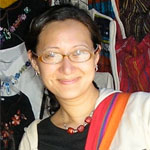HIV/AIDS in China

HIV/AIDS in China
- June 29, 2009
- UCI grad student studies the politics behind HIV/AIDS in China
-----
 Around the world, hundreds of organizations are involved each day in on-going efforts
to treat, prevent and ultimately eradicate HIV/AIDS. Elsa Fan, UCI anthropology graduate
student and former United Nations Development Program (UNDP) worker, says that amidst
these efforts, there may be conditions undermining crucial global health efforts.
Around the world, hundreds of organizations are involved each day in on-going efforts
to treat, prevent and ultimately eradicate HIV/AIDS. Elsa Fan, UCI anthropology graduate
student and former United Nations Development Program (UNDP) worker, says that amidst
these efforts, there may be conditions undermining crucial global health efforts.
"In China, HIV/AIDS has become, for many groups, a mode of survival," she says. "For
those infected, for example, access to antiretroviral medication also grants access
to additional social welfare benefits such as subsidized healthcare and living stipends."
With a newly awarded $3,000 UC Pacific Rim mini-grant fellowship, she will travel
to China to study how such factors may be affecting prevention efforts and what different
groups are doing to stem the spread of the epidemic. Through her fieldwork, she aims
to learn the stakes at hand for different groups and their perspectives on the competing
goals of HIV/AIDS prevention and the tensions it creates.
Fan, an alumnus of both UC Berkeley and the London School of Economics, spent eight
years working in the non-profit/non-governmental sector before coming to UCI in pursuit
of her Ph.D. During that time, she worked extensively in Asia implementing social
development projects, including those aimed at HIV/AIDS prevention.
"When I began working for UNDP China in the early millennium, AIDS was just beginning
to emerge as a concern for the country so it was still relatively obscure," she says.
According to the latest World Health Organization and UNAIDS statistics, there are
now approximately 33 million people living with the virus, 700,000 in China alone.
"Over the years, the epidemic has developed in very interesting ways, both politically
and socially. Given the complexity of HIV/AIDS, it is not just a biological disease,
it is also a social one. Understanding this and how key players perceive their roles
becomes important when thinking about how to address it."
UC Pacific Rim funding for her study will run through January 2010 and findings will
contribute to her on-going graduate research. Additional support has been provided
by the Center for Asian Studies, the Public Impact Fellowship, and the UCI anthropology
department.
-----
Would you like to get more involved with the social sciences? Email us at communications@socsci.uci.edu to connect.
Share on:
Related News Items
- Careet RightMeet Long U.S.-China Institute Visiting Scholar Lizhou Wang
- Careet RightFiserv, Block turn to crypto
- Careet RightThe mysteries of the mind
- Careet RightJayla Kamilla Pete awarded Moore Scholarship for Community and Social Change
- Careet RightChinese loans fuel Angola's future cities but analysts cautious over the costs


